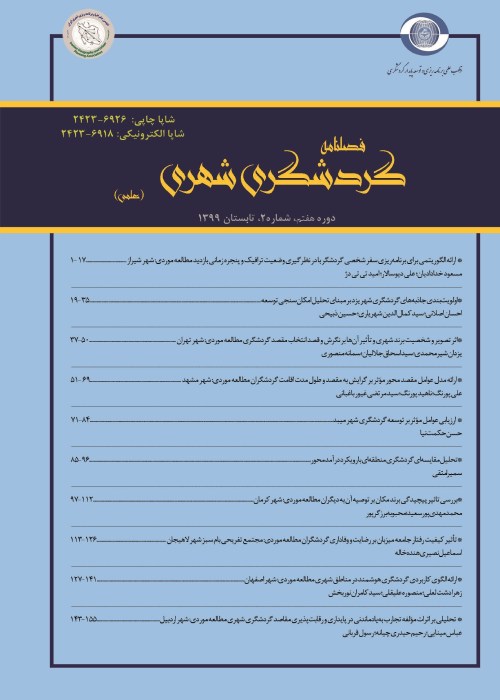Examining the Challenges of Smartening Eco-lodges
Author(s):
Article Type:
Research/Original Article (دارای رتبه معتبر)
Abstract:
A B S T R A C T
The ever-increasing progress of Information and communication technologies has caused tourism to move away from its traditional form, and the application of smart tourism has received much attention as one of the critical components of the development of the tourism industry. In the meantime, eco-lodges as one of the accommodation facilities whose demand has grown significantly in the recent years, must move towards developing smart tourism to meet the emerging needs of tourists, improve the tourist experience and increase their competitive advantage. However, there hasn't been enough research on the development of smart tourism in eco-lodges. Hence, the aim of this study is to identify the challenges of developing smart tourism in eco-lodges. The research method is practical in terms of its purpose and descriptive survey in data collection, and a qualitative approach has been used to answer the research questions. Sampling was done in a judgmental way and the number of samples was obtained based on the repetition of data and theoretical saturation during the interview. The information analysis in this research has been done using the theme analysis method. By extracting the challenges affecting the smartness of eco-lodges (codes, concepts, and categories), the researchers decided to present the relevant structure. Content validity was checked with the strategy of triangulation (researcher triangulation, methodological triangulation, theoretical triangulation), and the reliability of the research was also controlled by preparing and using a written framework (interview protocol) for the interview. Interviews were conducted by 12 owners and professional and experienced managers of eco-lodges. Then, by analyzing the themes of the interviews, 28 extraction codes and 5 concept extraction codes were formed. Technological challenges, economic challenges, specialized knowledge challenges, psychological challenges, and implementation challenges are the identified concepts, which have finally created the structure of smarting challenges of eco-lodges from the perspective of owners and managers by creating the category of smarting challenges.
Extended Abstract
which factors (challenges) affect the development of smart tourism in eco-lodge accommodations from the point of view of owners and managers of eco-lodges?
What are the dimensions and structures of the model of the challenges of developing smart tourism in eco-lodges?
Funding
There is no funding support.
Authors’ Contribution
All of the authors approved the content of the manuscript and agreed on all aspects of the work.
Conflict of Interest
Authors declared no conflict of interest.
Acknowledgments
We are grateful to all the scientific consultants of this paper.
The ever-increasing progress of Information and communication technologies has caused tourism to move away from its traditional form, and the application of smart tourism has received much attention as one of the critical components of the development of the tourism industry. In the meantime, eco-lodges as one of the accommodation facilities whose demand has grown significantly in the recent years, must move towards developing smart tourism to meet the emerging needs of tourists, improve the tourist experience and increase their competitive advantage. However, there hasn't been enough research on the development of smart tourism in eco-lodges. Hence, the aim of this study is to identify the challenges of developing smart tourism in eco-lodges. The research method is practical in terms of its purpose and descriptive survey in data collection, and a qualitative approach has been used to answer the research questions. Sampling was done in a judgmental way and the number of samples was obtained based on the repetition of data and theoretical saturation during the interview. The information analysis in this research has been done using the theme analysis method. By extracting the challenges affecting the smartness of eco-lodges (codes, concepts, and categories), the researchers decided to present the relevant structure. Content validity was checked with the strategy of triangulation (researcher triangulation, methodological triangulation, theoretical triangulation), and the reliability of the research was also controlled by preparing and using a written framework (interview protocol) for the interview. Interviews were conducted by 12 owners and professional and experienced managers of eco-lodges. Then, by analyzing the themes of the interviews, 28 extraction codes and 5 concept extraction codes were formed. Technological challenges, economic challenges, specialized knowledge challenges, psychological challenges, and implementation challenges are the identified concepts, which have finally created the structure of smarting challenges of eco-lodges from the perspective of owners and managers by creating the category of smarting challenges.
Extended Abstract
Introduction
The ever-increasing progress of Information and communication technologies has caused tourism to move away from its traditional form, and the application of smart tourism has received much attention as one of the critical components of the development of the tourism industry. Given the growing effect of smart technologies on the tourism industry, the growing impact of smart technologies on the tourism industry has prompted major international organizations, such as the World Tourism Organization and the World Economic Forum, to actively commit to promoting and fostering smart tourism globally. These entities recognize the transformative potential that smart technologies hold for the tourism industry, and their commitment serves as an acknowledgment of the imperative role that smart tourism plays in shaping the future of global tourism. In the meantime, the digitalization of tourism in Iran is also expanding rapidly, which can promise a future full of golden opportunities for tourism industry operators. However, smart tourism in Iran is still in the early stages of its development. Smart tourism and its benefits, especially in Ecotourism and Eco-lodge accommodations, have been neglected. Eco-lodges, one of the accommodation facilities whose demand has grown significantly in recent years, must move towards developing smart tourism to meet the emerging needs of tourists, improve the tourist experience and increase the competitive advantage. However, there hasn't been enough research on developing smart tourism in eco-lodges. When eco-lodges want to move towards smartening, they will face challenges; some are at the macro level and some at the micro level. Hence, this study aims to identify the challenges of developing smart tourism in eco-lodges from the point of view of the owners and managers of these accommodations. To address the purpose of this study, the following questions have been raised:which factors (challenges) affect the development of smart tourism in eco-lodge accommodations from the point of view of owners and managers of eco-lodges?
What are the dimensions and structures of the model of the challenges of developing smart tourism in eco-lodges?
Methodology
The research method is practical in terms of its purpose and descriptive survey in data collection, and a qualitative approach has been used to answer the research questions. Sampling was done in a judgmental way, and the number of samples was obtained based on the repetition of data and theoretical saturation during the interview. The information analysis in this research uses the theme analysis method. By extracting the challenges affecting the smartness of eco-lodges (codes, concepts, and categories), the researchers decided to present the relevant structure. Content validity was checked with the strategy of triangulation (researcher triangulation, methodological triangulation, theoretical triangulation), and the reliability of the research was also controlled by preparing and using a written framework (interview protocol) for the interview.Results and discussion
As it is clear, the current research, in order to investigate willingness/unwillingness, faces the questions that we have mentioned in the first step and at the beginning of the research. According to the stated questions and as mentioned before, the present research has been done in the qualitative phase. In order to answer the questions, firstly, by creating an interview, we had a conversation with 12 owners and experienced managers of eco-lodges who were selected by judgment. The interview continued until the required data reached the point of saturation. After each interview, the text of the interview was written on paper. The process of analyzing and Code extraction has been done by considering the issues and questions and open coding. It should also be noted that the coding process continued until theoretical adequacy was achieved. After the interview with the ninth person, we reached the point of saturation and coding, and to ensure this, we continued the interview until the twelfth person. Then, by analyzing the themes of the interviews, 28 extraction codes and 5 concept extraction codes were formed.Conclusion
Technological challenges, economic challenges, specialized knowledge challenges, psychological challenges, and implementation challenges are the identified concepts which have finally created the structure of smarting challenges of eco-lodge accommodations from the perspective of owners and managers by creating the category of smarting challenges. Identifying these challenges could be the first step in smoothing the path toward developing smart tourism in eco-lodges. On the one hand, the result of this research can be used in future research to identify solutions to overcome the challenges of developing smart tourism in the eco-lodges. On the other hand, it can be used in tourism development policies and programs, especially smart and sustainable tourism development programs. Moreover, it can provide a clear vision to move towards smartness for the owners of tourism businesses, especially eco-lodges accommodations.Funding
There is no funding support.
Authors’ Contribution
All of the authors approved the content of the manuscript and agreed on all aspects of the work.
Conflict of Interest
Authors declared no conflict of interest.
Acknowledgments
We are grateful to all the scientific consultants of this paper.
Keywords:
Language:
Persian
Published:
journal of urban tourism, Volume:10 Issue: 4, 2024
Pages:
17 to 35
magiran.com/p2700076
دانلود و مطالعه متن این مقاله با یکی از روشهای زیر امکان پذیر است:
اشتراک شخصی
با عضویت و پرداخت آنلاین حق اشتراک یکساله به مبلغ 1,390,000ريال میتوانید 70 عنوان مطلب دانلود کنید!
اشتراک سازمانی
به کتابخانه دانشگاه یا محل کار خود پیشنهاد کنید تا اشتراک سازمانی این پایگاه را برای دسترسی نامحدود همه کاربران به متن مطالب تهیه نمایند!
توجه!
- حق عضویت دریافتی صرف حمایت از نشریات عضو و نگهداری، تکمیل و توسعه مگیران میشود.
- پرداخت حق اشتراک و دانلود مقالات اجازه بازنشر آن در سایر رسانههای چاپی و دیجیتال را به کاربر نمیدهد.
In order to view content subscription is required
Personal subscription
Subscribe magiran.com for 70 € euros via PayPal and download 70 articles during a year.
Organization subscription
Please contact us to subscribe your university or library for unlimited access!




